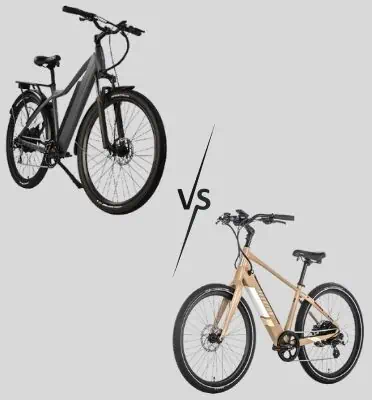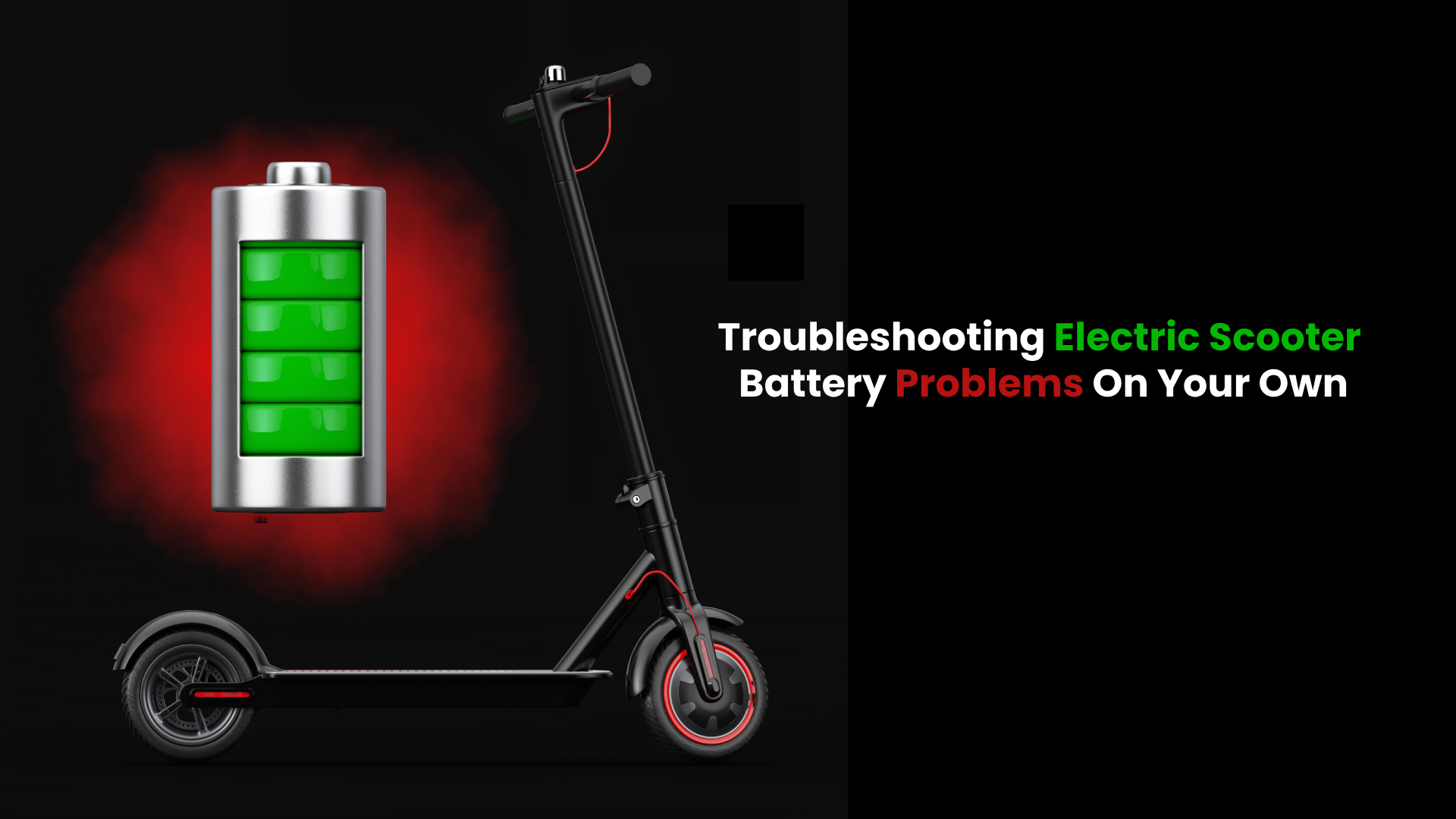Choosing the Ride1Up 500 vs Aventon Pace 500 will eventually come down to your needs as a rider, As both are affordable bikes with pretty attractive qualities.
While the Ride1Up 500 has some serious advantages over the Aventon Pace 500 (plus it’s cheaper) it doesn’t come with some of the high-end components that are standard on the Pace 500.
This article will take a deep dive into the differences between the two and hopefully help you choose the best option for your needs. Without further ado, let’s get into it!
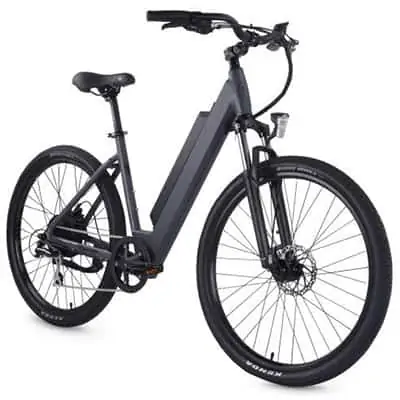
Ride1UP 500
Overall Rating:
- Riders Weight Limit | 275 lbs
- Motor | 750W Rear Hub Motor
- Range| Up to 25-45 Miles per Charge
- Battery| 48V, 13Ah Lithium-Ion Battery
- Speed | 20 MPH
VS
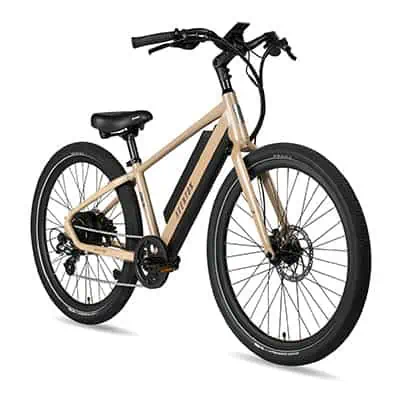
Aventon Pace 500
Overall Rating:
- Riders Weight Limit | 300 lbs
- Motor | 500W Rear Hub Motor
- Range| Up to 40 Miles per Charge
- Battery| 48V, 12.8Ah Lithium-Ion Battery
- Speed | 28 MPH
Also Related:
Ride1Up 700 Series vs Aventon Level – Head to Head Comparison
Differences Between the Ride1Up 500 Series and the Aventon Pace 500
Motor and Power
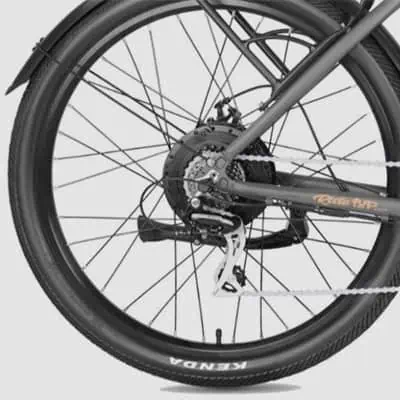
Ride1UP 500: Motor and Power
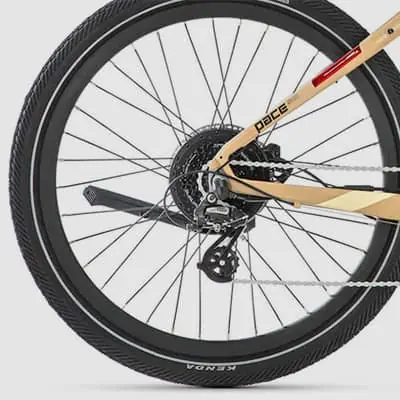
Aventon Pace 500: Motor and Power
The Ride1Up 500 is equipped with a 750-Watt rear hub-motor that puts out up to 1000 Watts of power at peak performance. This e-bike has a top pedal-assist speed of 28mph and can reach up to 20 miles an hour in throttle-only mode.
The Aventon Pace 500 comes with a slightly less powerful motor than the Ride1Up 500. Its 500W motor is also capable of propelling it to a top speed of 28mph, but don’t expect it to be able to keep up with the Ride1Up 500 when the time comes to climb steep inclines.
Range

Ride1UP 500: Range

Aventon Pace 500: Range
While the Ride1Up 500 Series comes with a slightly higher capacity battery (48V 13Ah) than the Aventon Pace 500 (48V 12.8Ah), real-world tests show that there isn’t much difference between the two in terms of range. In fact, the Aventon Pace 500 was able to cover an extra 0.71 miles of distance (27.88 miles) on the 500 Series’ max-assist range (27.17 miles).
Factors like wind direction and angle of incline weren’t considered during both tests, so riders should expect between 25 and 45 miles of range from both devices.
Speed
Both e-bikes are equal in terms of speed. They both have a top throttle-assist speed of 20 mph and a max pedal-assist speed of 28 mph.
One would expect the Ride1Up to be faster since it comes with a more powerful motor, however, e-bike laws restrict all battery-powered bicycles to a top speed of 28mph.
Also Related:
Best 500 Watt Electric Bikes | How We Chose Ours?
Hill Climbing
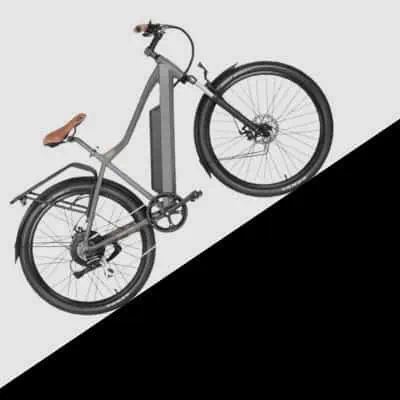
Ride1UP 500: Hill Climbing

Aventon Pace 500: Hill Climbing
If I had to choose the best hill climber between the Ride1Up 500 and the Aventon Pace 500, my pick would definitely be the former. In a hill-climbing test conducted by Electric Bike Report, the Ride1Up was able to travel up a 0.34 mile, 12% grade hill in throttle-only mode. The bike was able to achieve this feat in under 2 minutes and 43 seconds.
Aventon’s Pace 500, on the other hand, couldn’t make it up the same hill on throttle power only. It did, however, manage to ascend up that hill in its highest pedal-assist setting, reaching its destination in 97 seconds with an average speed of 11.2mph (versus 73 seconds and 11.8mph on the Ride1Up 500 Series).
Ride Smoothness
This is another area where the Ride1Up 500 comes out on top. This commuter electric bike is fitted with coil spring forks that allow the front wheel to independently react to large bumps on the road.
Weight Limit and Net Weight
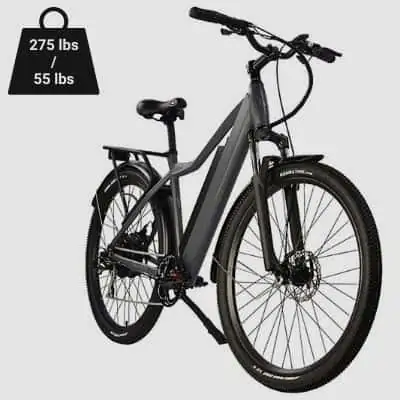
Ride1UP 500: Weight Limit and Net Weight
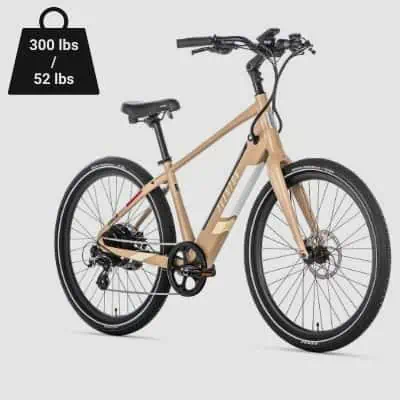
Pace 500: Weight Limit and Net Weight
The Aventon Pace 500 weighs 52 lbs (23.6 kg) and can support up to 300 lbs (136 kg) of weight while the Ride1Up 500 has a net weight of 55 lbs (25 kg) and a payload capacity of 275 lbs (125 kg).
If you’re a heavy rider you might want to consider the Pace 500 as it can hold up more weight than the Ride1Up 500.
Portability
The Ride1Up 500 is slightly larger than the Pace 500. Its seat can be adjusted to a max height of 40 inches while the Pace 500’s saddle peaks at about 37 inches from the ground.
The bike also measures up to 71” in length; one inch longer than the Aventon Pace 500. Both e-bikes’ frames are not collapsible.
Comparing Build Quality between Ride1Up 500 vs Aventon Pace 500
Aventon is known for putting extra care into designing their bikes and the new generation Pace 500 isn’t any different. From the bike’s integrated electronic components to its smooth welds, the Aventon Pace 500 is a delight to behold.
Plus, the bike’s kickstand is located in the rear so it doesn’t get in the way of the pedals. The Ride1Up 500 is also a nicely built e-bike but one of the biggest gripes I have with it is how the battery sticks out of the down tube.
I mean most people might not even be able to tell that the Pace 500 is an electric bike because how its battery is fitted nicely and flush with the frame.
Also Related:
Display and Controls
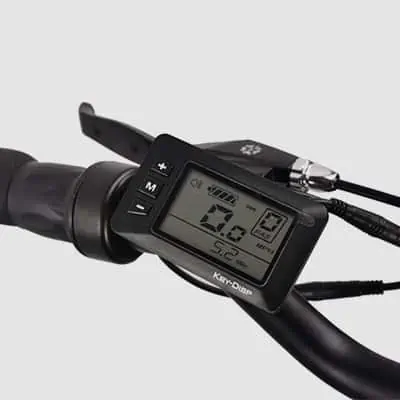
Ride1UP 500: Display and Controls

Aventon Pace 500: Display and Controls
The Ride1Up 500 comes with a grayscale LCD display that reports riders’ speed, distance traveled, remaining battery capacity, and pedal-assist level. One cool thing about this device is that it allows riders to switch between nine different levels of motor assistance.
This should even out the power jumps riders usually experience on e-bikes with just five levels of pedal assist. The LCD display also allows riders access the bike’s walk-assist functionality (a low-speed mode that provides motor assistance as you push the bike along)
Switching gears to the Aventon Pace 500, riders get an even more advanced LCD display than on the 500 Series. The Pace 500’s full-color display lays out the bike’s range, speed, battery percentage (instead of just bars), and pedal-assist level.
The device also supports mobile app connectivity and comes with a USB port.

Ride1UP 500
Overall Rating:
- Riders Weight Limit | 275 lbs
- Motor | 750W Rear Hub Motor
- Range| Up to 25-45 Miles per Charge
- Battery| 48V, 13Ah Lithium-Ion Battery
- Speed | 20 MPH
VS

Aventon Pace 500
Overall Rating:
- Riders Weight Limit | 300 lbs
- Motor | 500W Rear Hub Motor
- Range| Up to 40 Miles per Charge
- Battery| 48V, 12.8Ah Lithium-Ion Battery
- Speed | 28 MPH
Water Resistance
Ride1Up electric bikes have some of the highest ingress-protection ratings you’re ever going to find on the market. Their bicycles — including the 500 Series — are designed to meet the IP65 water-resistance standard.
This means their electronic components are shielded against ingress from dust and water from pressurized nozzles. Aventon e-bikes, on the other hand, are not as water-resistant as Ride1Up bicycles.
Their bikes have no specific rating against solid ingress, but they are protected against water splashes from all directions (IPX4).
Suspension and Tire
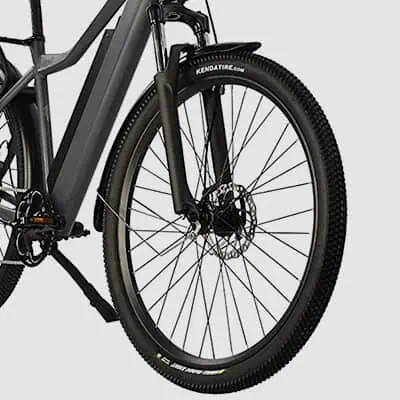
Ride1UP 500: Suspension and Tire
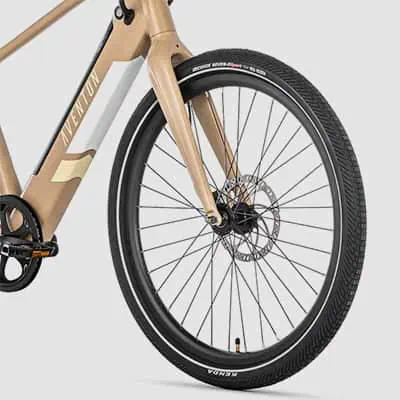
Aventon Pace 500: Suspension and Tire
The Aventon Pace 500 comes with a rigid fork while the Ride1Up 500 is equipped with a coil spring fork that supports up to 100mm of travel.
Both e-bikes are equipped with 27.5 by 2.2” tires. The Ride1Up 500’s tires don’t come with reflective sidewalls, whereas that feature comes standard on the Aventon Pace 500.
All in all, it’s safe to say that the Ride1Up 500 is a better multi-terrain electric bicycle than the Pace 500. Its suspension forks can even be adjusted to the rider’s needs.
Also Related:
Where Are Aventon Ebikes Made and Is This a Good Brand
Upgrades and Accessories
Neither of the two bicycles comes preinstalled with a rack or a pair of fenders. However, Ride1Up let’s buyers add both accessories to their orders for just $100 extra.
Pace 500 riders (and potential buyers) can also get these accessories from the official Aventon website. Just keep in mind that theirs (the rear rack and fenders) cost almost $135.
Another utility that the Ride1Up 500 seems to be missing is a rear light. This e-bike comes with a Buchel 50 Lux headlight mounted on the fork’s brace but doesn’t come standard with a tail light.
Nevertheless, there are brake lights attached to the bike’s optional rear rack. The good thing about purchasing the Aventon Pace 500 is that it comes standard with a handlebar-mounted headlight and a pair of rear lights integrated into its seat stay.
Pros and Cons of the Ride1Up 500 Series
Pros
- This e-bike has nine different levels of pedal assistance.
- Riders can engage the motor using the throttle at any time, even in assist level zero.
Cons
- The bike’s fork doesn’t have a “lockout” option.
- Many riders have complained about how hard it is to assemble this e-bike. While Ripde1Up provides a step-by-step guide on how to do so, some customers say they had to take their units to bike shops to get them fully assembled.
Pros and Cons of the Aventon Pace 500
Pros
- Its cruiser-style frame promotes a more upright riding position, minimizing the amount of stress you place on your wrists and shoulders.
- It actually comes with hydraulic disc brakes.
Cons
- It is a little bit pricier than other electric bikes in its class. Electric bikes in the Pace 500’s range typically cost between $1300 and $1500. For example, the Radrunner 2 comes with a more powerful motor (750W) than the Pace 500 and also features a higher-capacity battery (48V 14Ah). But guess what: the Pace 500 costs almost $200 more than the Radrunner.
- It does not come with a dedicated suspension system.
Also Related:
Waterproof Electric Bikes | Keep It Dry In Any Wet Conditions
Tabular Representation of the Differences Between the Ride1Up 500 and the Aventon Pace 500
| Comparison Category | Ride1Up 500 | Aventon Pace 500 |
|---|---|---|
| Motor and power |
750-Watt motorUp to 1000 Watts of peak power |
500-Watt motorUp to 800 Watts of peak power |
|
Range |
Up to 45 miles on a single charge |
Between 25 and 45 miles of travel on a full charge |
|
Speed |
20mph in throttle-assist mode and up to 28mph pedal-assist mode |
20mph in throttle-assist mode and up to 28mph pedal-assist mode |
|
Hill climbing |
Traveled up a 12% grade incline (in pedal assist 5) with an average speed of 11.8 mph |
Rode up the same incline (in pedal assist 5) with an average speed of 11.2 mph |
|
Weight limit |
275 lbs |
300 lbs |
|
Net weight |
55 lbs |
52 lbs |
|
Geometry |
– Height range: 5’5” – 6’4”- Wheelbase: 43”- Max seat height: 40” |
Available in two sizes; regular and large.Regular– Height range: 5’1” – 5’11”- Wheelbase: 43”- Max seat height: 37”Large– Height range: 5’11” – 6’4″- Wheelbase: 45”- Max seat height: 39” |
|
Display |
Standard grayscale LCD |
Full-color LCD with mobile sync option |
|
Water resistance |
IP65 |
IPX4 |
|
Suspension and Tires |
Coil spring fork 27.5” by 2.2” pneumatic tires |
Rigid fork 27.5” by 2.2” pneumatic tire |
|
Brakes |
Mechanical disc brakes |
Hydraulic disc brakes |
Who’s the Ride1Up 500 Series For
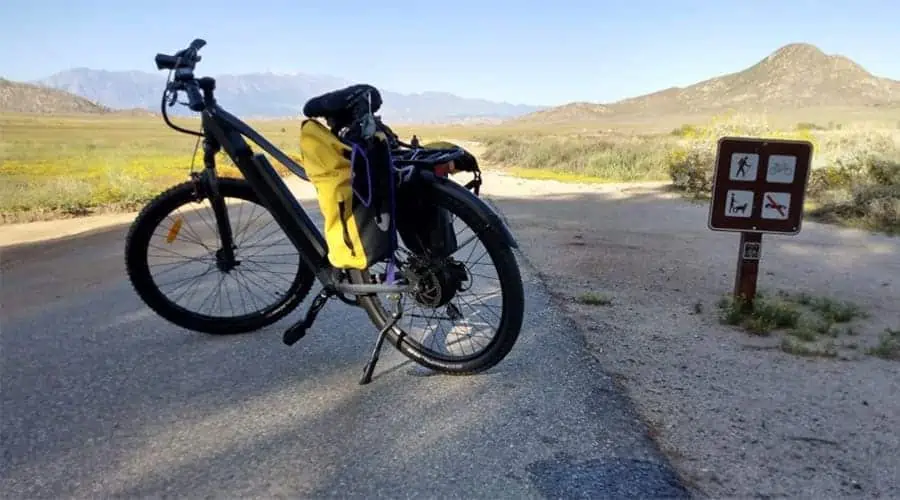
As stated earlier, the Ride1Up 500 is a multi-terrain e-bike. It is designed for riding on flat roads as well as rocky and loose terrain.
This electric bike is great for commuters and riders looking to do some light off-road riding.
Who’s the Ride1Up 500 Series ‘Not’ For
The Ride1Up 500 might not be the best electric bike for hunters and racers. It’s simply not powerful enough to carry out heavy-duty tasks like towing or hauling heavy equipment up steep, unpaved surfaces.
It’s also not aerodynamic or lightweight enough to be considered a racing e-bike.
Who’s the Aventon Pace 500 For
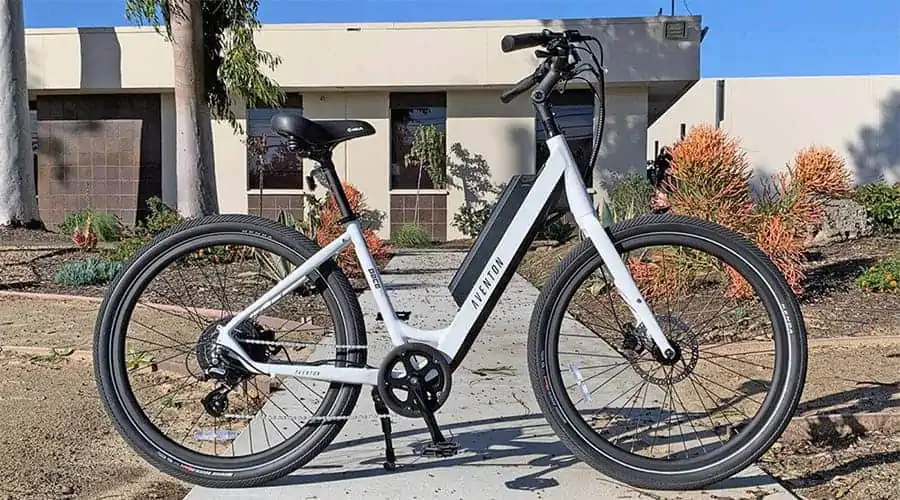
Anyone from commuters to recreational riders will enjoy using this e-bike. It’s easy and comfortable to ride and is also available in low-step design.
Who’s the Aventon Pace 500 ‘Not’ For
The Aventon Pace 500 is only designed for riding on flat roads. It does not come with front nor rear suspension.
Plus, it weighs over 50 lbs making it unideal for riders who would love to carry their bikes during commutes.

Ride1UP 500
Overall Rating:
- Riders Weight Limit | 275 lbs
- Motor | 750W Rear Hub Motor
- Range | Up to 25-45 Miles per Charge
- Battery| 48V, 13Ah Lithium-Ion Battery
- Speed | 20 MPH
VS

Aventon Pace 500
Overall Rating:
- Riders Weight Limit | 300 lbs
- Motor | 500W Rear Hub Motor
- Range| Up to 40 Miles per Charge
- Battery| 48V, 12.8Ah Lithium-Ion Battery
- Speed | 28 MPH

